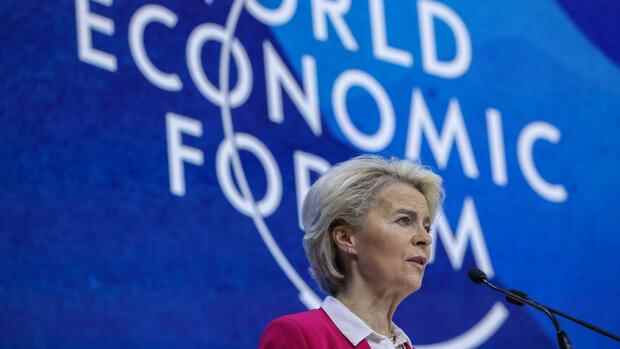The head of the EU Commission called for all international forces to be pooled in order to put Russia in its place.
(Photo: Bloomberg)
davos With an insight into the EU’s crisis management, Commission chief Ursula von der Leyen has lightened the gloomy mood among the global elite in Davos. At the end of her speech, the German received a lot of applause, even some bravos.
Von der Leyen tried to provide an EU response to all current challenges. “This is not just a question of Ukraine’s survival,” the EU leader made clear right from the start. It is not only a question of European security. “Here our entire international order is being called into question. And that is why countering Russian aggression is a task for the entire world community.”
Von der Leyen is therefore focusing on more international cooperation. “We are mobilizing all our economic power,” she said, referring to the economic sanctions against Russia.
After the call for help from Ukrainian President Volodymyr Zelenskiy the day before, the politician also turned her attention to Ukraine. “The country now needs financial help,” emphasized the CDU politician. “We have proposed financial aid of over ten billion euros – the largest financial package that the European Union has ever designed for a third country.”
Top jobs of the day
Find the best jobs now and
be notified by email.
When it comes to financing, the EU does not seem to shy away from using the confiscated assets of Russian oligarchs. “We should leave no stone unturned – if possible also with Russian means.”
Corruption in Ukraine
Von der Leyen only briefly mentioned that such financial aid in a country like Ukraine with a long history of corruption also entails considerable risks. “The country’s reconstruction should combine massive investments with ambitious reforms to modernize the Ukrainian administration, firmly establish the rule of law and the independence of the judiciary, and fight corruption,” she said.
The war in Ukraine is also forcing the EU to accelerate the transformation of the European economy towards renewable energies. The Commission has just presented its “REPowerEU” program. The €300 billion plan aims to accelerate Russia’s phase-out of fossil fuels and transition to green energy sources. Their share of energy consumption is set to rise from 25 today to 45 in 2030.
The EU also relies on international cooperation to reduce Europe’s dependency on important raw materials such as lithium. “Here, too, strong international partnerships are at the heart of the solution,” said von der Leyen.
>> Read also: EU wants to help Ukraine in the short term with a loan of nine billion euros
The head of the commission devoted a lot of space to the international food crisis triggered by the war in Ukraine. “We are witnessing Russia weaponizing its energy supply. Unfortunately, the same pattern is emerging when it comes to food security.”
20 million tons of wheat are currently stored in Ukraine. In the past, five million tons of wheat were exported per month. Now it is only 200,000 to one million tons. “By getting the wheat out of Ukraine, we can provide Ukrainians with much-needed revenue and provide the World Food Program with much-needed supplies,” von der Leyen said. To this end, the EU is opening “solidarity routes” that could connect Ukraine’s borders with European ports. The former export route via the Black Sea is blocked by a naval blockade by Russia.
In the end, WEF founder Klaus Schwab wanted to know whether Russia could still return to the European family: “If Russia finds its way back to democracy and the rule of law, it can come back,” said von der Leyen. Russia remains a neighbor.
More: The war brought Europe together – now the first cracks are appearing
